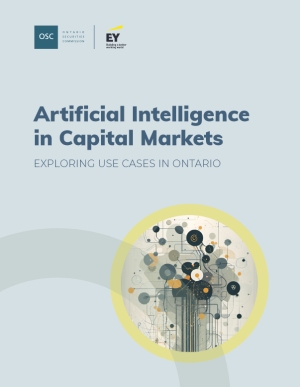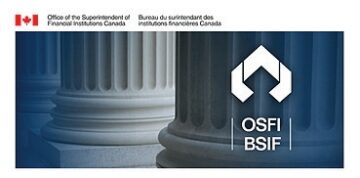March 29, 2024
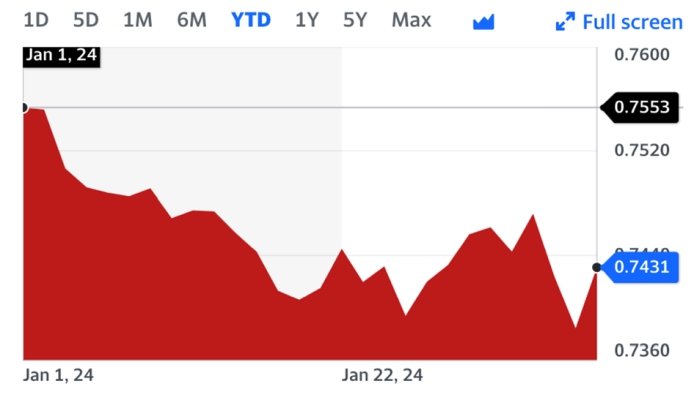
 Image: Yahoo Finance, CAD/USD Chart
Image: Yahoo Finance, CAD/USD ChartThe world of international finance is characterized by millions of transactions daily. Canada remains an important player on the global stage, with the Canadian foreign exchange market offering plenty of exciting opportunities to traders and investors worldwide. The CAD/USD currency pair is a hot favorite among traders in North America and Europe, with interesting volatility for the year to date. On January 1, 2024, the pair started trading at 0.7553, and six weeks later, it’s hovering around 0.7431. A marginal strengthening of the Canadian dollar bodes well for bullish traders in Maple country.
Many retail and institutional traders are taking to the virtual arena to test the waters. Given the extreme volatility of the forex market, many opt for demo trading accounts to better understand the nuances, intricacies, and fluctuations possible in FX trading. To this end, demo trading accounts prove invaluable when learning how to trade forex in real time. This fast-paced market is characterized by trillions of dollars in daily trades, dwarfing the collective trading volume of stocks, commodities, indices, and cryptocurrency combined.
Forex Trading in Canada – Trends, Patterns, and Realities
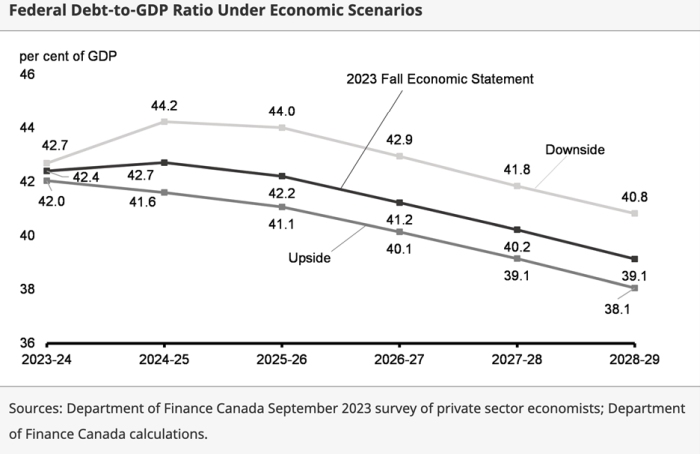
 Image: DoF, Debt to GDP
Image: DoF, Debt to GDPAccording to Budget Canada, responsible fiscal stewardship has placed the country in an enviable position. The pandemic ravaged the global economy. However, Canada was largely spared economic ruination owing to proactive government support and investments within the broader context of a robust monetary and fiscal framework. Viewed in perspective, these measures have ensured the long-term prosperity of the Canadian economy. Based upon the September 2023 survey (private-sector economists), a budgetary balance of under $40.1 billion (deficit) is forecast for 2023/2024. That amounts to 1.4% of the gross domestic product.
Projecting ahead to 2028/2029, the deficit is expected to improve to $18.4 billion, or -0.5% of GDP. From an optimistic POV, analysts anticipate a budgetary improvement of $5.2 billion annually, with a debt/GDP ratio dropping to 41.6% in 2024/2025 (from 42.0% in 2023/2024). Of course, the flip side is also possible, with a deterioration in the budgetary balance to $8.5 billion annually, with an additional 1.7% added to the debt/GDP ratio by 2028/2029. Regardless, the downside alternative is less than one percentage point of GDP in the forecast timeframe.
A variety of macroeconomic variables, domestic and global, heavily influence the Canadian dollar. These include a confluence of forces, notably:
- A strong recovery in the price of crude oil – Canada is a major global producer of crude
- A weakening of the USD – the US dollar index reflects declining performance.
- Changing economic indicators – the CAD directly impacts key data such as inflation, interest rates, GDP, unemployment, etc.
The forex trading industry is certainly robust and regulated across Canada. This ensures the integrity of operations for stakeholders – platform providers, retail and institutional traders alike. Various regulatory authorities, foremost among them the Canadian Securities Administrators and the Canadian Investment Regulatory Organisation, are leading the way in this regard.
Indeed, the CSA defines Forex trading as buying one currency and selling the other currency in the same pair and attempting to generate profit through speculative measures. With online trading platforms, there are many traditional and non-traditional options – notable among them buying hard currency and selling it to realize gains and CFDs (contracts for difference) where traders speculate on the underlying financial instruments’ price movements without owning any currencies.
Given the outsized volatility of these financial instruments, it is important to point out that any form of Forex trading is risky. Currency trading in CFD format comes with many risks, which may not be suitable for all types of traders. Given the leverage in play, it is possible to generate substantial profits or losses, depending upon which way the trades go. Forex trading is a volatile proposition, with one side profiting and the other losing. However, careful and systematic analysis of the financial markets can certainly ameliorate downside potential and lead to more favorable outcomes.
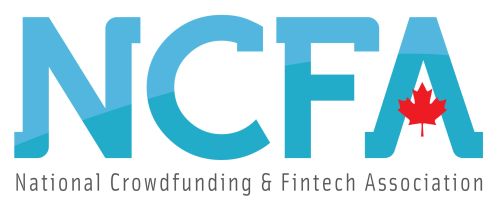
 The National Crowdfunding & Fintech Association (NCFA Canada) is a financial innovation ecosystem that provides education, market intelligence, industry stewardship, networking and funding opportunities and services to thousands of community members and works closely with industry, government, partners and affiliates to create a vibrant and innovative fintech and funding industry in Canada. Decentralized and distributed, NCFA is engaged with global stakeholders and helps incubate projects and investment in fintech, alternative finance, crowdfunding, peer-to-peer finance, payments, digital assets and tokens, artificial intelligence, blockchain, cryptocurrency, regtech, and insurtech sectors. Join Canada’s Fintech & Funding Community today FREE! Or become a contributing member and get perks. For more information, please visit: www.ncfacanada.org
The National Crowdfunding & Fintech Association (NCFA Canada) is a financial innovation ecosystem that provides education, market intelligence, industry stewardship, networking and funding opportunities and services to thousands of community members and works closely with industry, government, partners and affiliates to create a vibrant and innovative fintech and funding industry in Canada. Decentralized and distributed, NCFA is engaged with global stakeholders and helps incubate projects and investment in fintech, alternative finance, crowdfunding, peer-to-peer finance, payments, digital assets and tokens, artificial intelligence, blockchain, cryptocurrency, regtech, and insurtech sectors. Join Canada’s Fintech & Funding Community today FREE! Or become a contributing member and get perks. For more information, please visit: www.ncfacanada.org
Related Posts
- SEO Powered Content & PR Distribution. Get Amplified Today.
- PlatoData.Network Vertical Generative Ai. Empower Yourself. Access Here.
- PlatoAiStream. Web3 Intelligence. Knowledge Amplified. Access Here.
- PlatoESG. Carbon, CleanTech, Energy, Environment, Solar, Waste Management. Access Here.
- PlatoHealth. Biotech and Clinical Trials Intelligence. Access Here.
- Source: https://ncfacanada.org/the-future-of-forex-trading-in-the-fintech-era-innovations-and-implications/
- :has
- :is
- :not
- :where
- 1
- 150
- 2%
- 2018
- 2023
- 2024
- 29
- 33
- 339
- 4
- 41
- 42
- 5
- 62
- a
- Accounts
- across
- added
- Additional
- affiliates
- ahead
- alike
- All
- also
- alternative
- alternative finance
- america
- among
- amounts
- an
- analysis
- Analysts
- and
- Annually
- anticipate
- any
- ARE
- Arena
- around
- artificial
- artificial intelligence
- AS
- Assets
- At
- attempting
- Authorities
- Balance
- based
- BE
- become
- Better
- Billion
- blockchain
- broader
- budget
- Bullish
- Buying
- by
- cache
- CAD
- CAN
- Canada
- Canadian
- Canadian Dollar
- careful
- certainly
- CFD
- CFDs
- characterized
- Chart
- closely
- Collective
- combined
- comes
- Commodities
- community
- confluence
- context
- contracts
- country
- course
- create
- Crowdfunding
- crude
- cryptocurrency
- currencies
- Currency
- daily
- data
- Date
- Debt
- decentralized
- Declining
- DEFICIT
- Defines
- Demo
- Depending
- difference
- digital
- Digital Assets
- directly
- distributed
- DOF
- Dollar
- dollar index
- dollars
- Domestic
- downside
- Dropping
- Economic
- economists
- economy
- ecosystem
- Education
- end
- engaged
- ensured
- ensures
- enviable
- Era
- etc
- Ether (ETH)
- Europe
- exchange
- exciting
- expected
- extreme
- fast-paced
- favorable
- Favorite
- finance
- financial
- financial innovation
- Financial Instruments
- fintech
- Fiscal
- Flip
- fluctuations
- For
- Forces
- Forecast
- foreign
- foreign exchange
- foreign exchange market
- foremost
- forex
- forex market
- Forex Trading
- form
- format
- Framework
- from
- funding
- funding opportunities
- future
- FX
- Gains
- GDP
- generate
- get
- given
- Global
- Global economy
- Go
- Government
- government support
- gross
- Hard
- Have
- heavily
- helps
- High
- HOT
- However
- http
- HTTPS
- image
- Impacts
- implications
- important
- improve
- improvement
- in
- include
- index
- Indices
- industry
- inflation
- influence
- information
- Innovation
- innovations
- innovative
- Institutional
- instruments
- Insurtech
- integrity
- Intelligence
- interest
- Interest Rates
- interesting
- International
- intricacies
- invaluable
- investment
- Investments
- Investors
- IT
- Jan
- January
- jpg
- Key
- largely
- later
- lead
- leading
- less
- Leverage
- long-term
- losing
- losses
- Macroeconomic
- major
- many
- Maple
- marginal
- Market
- Markets
- max-width
- May..
- measures
- member
- Members
- millions
- Monetary
- more
- movements
- networking
- North
- north america
- notable
- notably
- nuances
- of
- offering
- on
- ONE
- online
- Operations
- opportunities
- opt
- Optimistic
- Options
- or
- organisation
- Other
- out
- outcomes
- owning
- pair
- pandemic
- partners
- patterns
- payments
- peer to peer
- percentage
- performance
- perks
- perspective
- placed
- platform
- Platforms
- plato
- Plato Data Intelligence
- PlatoData
- Play
- player
- please
- Plenty
- Point
- position
- possible
- potential
- price
- Proactive
- producer
- Product
- Profit
- profiting
- profits
- projects
- proposition
- Prove
- providers
- provides
- Rates
- ratio
- real
- real-time
- realities
- realize
- recovery
- reflects
- regard
- Regardless
- Regtech
- regulated
- regulatory
- remains
- responsible
- retail
- Reuters
- risks
- Risky
- robust
- s
- same
- Sectors
- Securities
- Selling
- September
- Services
- side
- SIX
- speculate
- speculative
- Stage
- stakeholders
- started
- Stewardship
- Stocks
- strengthening
- strong
- substantial
- such
- suitable
- support
- Survey
- taking
- test
- than
- that
- The
- The Future
- Them
- There.
- These
- this
- thousands
- Through
- time
- timeframe
- to
- today
- Tokens
- trade
- Traders
- trades
- Trading
- Trading Platforms
- trading volume
- traditional
- Transactions
- Trends
- trillions
- types
- under
- underlying
- understand
- unemployment
- upon
- us
- US Dollar
- US Dollar Index
- USD
- variables
- variety
- various
- vibrant
- viewed
- Virtual
- Visit
- volatile
- Volatility
- volume
- was
- Waters
- Way..
- Weeks
- WELL
- when
- which
- with
- within
- without
- works
- world
- worldwide
- Yahoo
- yahoo finance
- year
- zephyrnet




